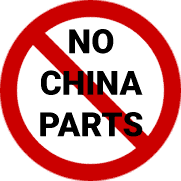Blog
What Type of Fasteners Are Used on Aircraft?
What Type of Fasteners Are Used on Aircraft?
Fasteners are components that allow for the permanent or temporary assembly of parts, and they come in many different types, shapes, and sizes to accommodate varying needs. For aircraft construction and maintenance in particular, a number of fasteners are used, all of which are built to meet the quality standards and performance requirements necessary to excel under harsh conditions that are typical during flight. In this blog, we will discuss some of the common types of aerospace fasteners that are used on an aircraft, as well as the most common materials they are made out of.
On a typical aircraft, fasteners can account for nearly half of the total parts that make up the assembly itself. While quite a few types are used, the core fasteners that assist in aircraft construction consist of bolts, screws, nuts, rivets, and washers. A bolt fastener is a type of threaded component that serves general purpose uses, and they are used to secure two or more parts together by passing through preformed holes and mating with a correlating nut. Aerospace bolts may come in a number of types, the most popular for aircraft being general purpose, AN, NAS, MS, and close tolerance bolts. In order to excel in harsh environments, aerospace bolts are often produced from cadmium or zinc plated corrosion resistant steel, anodized aluminum alloys, or unplated corrosion-resistant steel.
Screws are another type of threaded fastener that is commonly compared to bolts. Unlike bolts, however, screws do not pair with a nut and simply bore their own hole into the material they are installed in. Screws are regularly constructed from low strength materials and are installed with a loose fitting thread, thus they perform less intensive tasks as compared to bolts. Nevertheless, they may be considered to be the most commonly used aerospace fastener.
Aerospace nuts often come in the form of a donut-shaped fastener with a threaded hole, and they may be paired with a bolt or screw that has matching threading. For their construction, nut fasteners are made from cadmium plated carbon steel, anodized 2024T aluminum alloy, or stainless steel. Additionally, they may also be procured in either self-locking or non-self-locking types, the former being those that prevent loosening as a result of vibration and other forces.
Rivets are a common type of aerospace fastener, such components featuring a smooth, cylindrical shaft with a head on one side. As a type of permanent mechanical fastener, rivets can secure metal sheets, plates, or other various materials together. For their installation, the tail-end of the fastener is passed through the holes of components before using a tool to upset the tail. This creates a second head on the fastener, ensuring that two or more pieces are permanently secured together.
The final common aerospace fastener is the washer, and such components often come in the form of a thin, metallic plate with a hole in its center. Washers can come in numerous types to accommodate different needs, their typical variations including plain, lock, and special washers. Depending on the application, washers can be constructed from a number of lightweight or strong materials, and they can serve as spacers, vibration reducers, load distributors, locking devices, wear pads, and much more.
Depending on the section of the aircraft that is being worked on, and its general performance requirements, many materials may be used to construct a fastener. Titanium is most commonly used for its optimal strength-to-weight ratio, making it a perfect fit for aircraft construction. With different alloys, a titanium bolt assembly or threaded fastener can be constructed to bear loads better, withstand heat, resist corrosion, and more.
Aluminum is a commonplace material for aerospace applications due to its low price-point and low weight. Due to the limitations of its abilities, aluminum is often treated to enhance its properties. Across all alloys, the most popular is AI 7075 due to its optimal fatigue strength and general strength.
When high strength is needed, steel may be used at the cost of a higher weight. Because of this, a steel fastener assembly will serve the most important roles, such as being placed within landing gear. Steel fasteners also are used on the aircraft surface, serving as the main aerospace fastener material for strength.
With high-quality, robust aerospace fasteners, one can best ensure the health and performance of their aircraft. ASAP Part Services is an online distributor of aircraft parts, and we are your sourcing solution for top-quality fastener assembly products that you can rely on with ease. With AS9120B, ISO 9001:2015, and FAA AC 00-56B certification and accreditation, we exceed industry standards to guarantee items of the highest caliber for every order. Explore our expansive part catalog as you see fit, and our industry experts are ready to assist you through the purchasing process as necessary. Experience the future of part procurement today when you connect with an ASAP Part Services dedicated account manager.
-
henry fayol
-
Posted on December 8, 2021
- fasteners

